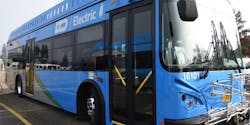The Lane Transit District’s (LTD) sustainability efforts date back to 2007 when the board adopted its first Sustainability Policy. The policy committed the district to pursue action in the following four areas: provide quality service; use environmentally friendly vehicles; construct earth friendly projects; and use sustainable operating practices.
Since then, the district has made strides in making these goals a reality by using a triple bottom line approach, which identifies the three components of sustainability as financial, environmental and social equity. The financial aspect looks at being responsible stewards of financial resources; the environmental aspect considers LTD’s impacts and how efficient impact reduction efforts are to the physical and natural environment; and the social equity aspect examines the community, employees, stakeholders and riders to ensure their health and safety, explains Kelly Hoell, LTD sustainability program manager.
While LTD has been using this triple bottom line approach for more than a decade, Hoell’s position has only been around since 2018. Hoell notes this was the first time LTD had a paid position that focused on its sustainability program. It was created to provide the resources and human power needed to collaborate across departments on various initiatives.
“By creating a position that could coordinate between all of those efforts and have that as a primary piece of their work, then it could sustain momentum and make sure that things were continuing to move forward at the pace the organization desired,” Hoell explained.
Hoell, who has a degree in environmental science, brings a unique skillset to the position—a skillset that is not normally within a transit agency, shares LTD General Manager Aurora Jackson.
“Based on her environmental background, and adapting it to public transportation, she’s really had to do things that other transit agencies have not done,” Jackson said.
A prime example is the greenhouse gas (GHG) inventory Hoell conducted to understand transit’s impacts on the environment, as well as the benefits it brings to the community. The inventory examined not just the fuel types being used, but the life cycle of the vehicles, how the vehicles are produced and the entire production cycle of the fuel types, to name a few.
For example, the inventory not only measured life cycle emissions from LTD’s electric buses, but it also examined LTD’s indirect emissions from its purchased electricity for its own use.
“Because the last thing you want is fossil fuel to be powering your electricity because then you’re not making a difference,” Jackson said.
The greenhouse gas inventory results were released in September 2019 and underlined two big takeaways. First, the number one thing LTD can do to address climate change is to take as many cars as possible off the road by increasing transit ridership. The second most important thing the report revealed was that “we could focus on reducing the carbon intensity of our owned fleet vehicles,” Hoell said.
Intentionally Setting Fleet Transition Goals
Knowing these two things led the LTD Board to adopt an updated climate action policy statement with fleet procurement goals in June 2020. The policy directed the district to reduce its GHG emissions by 75 percent over the next 10 years and eliminate its use of fossil fuels in its fleet over the next 15 years. The board created short- and long-term goals to get there.
The first short-term goal the board outlined for LTD said that “within three years, we will have 25 percent of our fleet, which is 25 buses, all electric. We’ve already had delivery of 11 [electric] buses and awarded a contract [in April 2021] for 19 more. So, we have the 30 [buses] already in the queue to meet that goal,” Jackson said.
For the long-term goals, the board remained technology agnostic and instead focused on the desired outcomes of GHG and fossil fuel reduction. So, while LTD will continue to electrify its fleet, it’s simultaneously conducting a fleet procurement plan, in partnership with consulting firm WSP, to evaluate all the different fuels and technologies on the market today for the conditions specific to LTD’s operating area in Lane County, Oregon.
Similarly to how Hoell’s GHG inventory looked at the entire production and life cycle, the fleet procurement plan will look at the long-term vehicle replacement for the next 70 buses, as well as the 30 electric buses. Jackson adds the plan will examine the life cycle impact of the buses and if electrifying the entire fleet is really the best option moving forward when considering the triple bottom line approach.
One alternative to electricity LTD is interested in and will examine in the fleet procurement plan is hydrogen fuel cell technology. Coincidentally, the Eugene Water & Electric Board (EWEB), a local utility company, is in the planning stage of building a hydrogen facility powered by hydropower instead of fossil fuels, producing storable green power. This could give LTD an opportunity to use hydrogen-fueled vehicles, but Jackson quickly noted this would require a partnership with EWEB. Otherwise, LTD would either need to build its own hydrogen fueling station or rely on diesel trucks to bring it in to the local area.
“Although there would be some reduction from our vehicles, we’re still not weaning ourselves off fossil fuels,” Jackson said. “But we are optimistic that hydrogen fuel cell power in a partnership with EWEB could be viable.”
Partnerships Provide Funding Opportunities
EWEB isn’t the only utility company LTD is working with. Between 2016 and 2017, LTD worked with the Springfield Utility Board (SUB) to redo its bus yard to convert and add the necessary infrastructure to support an electric fleet. And the district didn’t stop there. Noting the challenges agencies in California faced working with the utility companies, Hoell has testified before the SUB Board members and staff asking about charging rates to avoid surcharges associated with peak demand.
Beyond the utility companies, LTD is working with the surrounding communities to research and procure lower carbon alternatives for construction materials, such as warm mix asphalt, Hoell explains. This relates to the GHG inventory that also examined efficiency improvements related to the goods and services LTD consumes.
“Even though LTD doesn’t have direct ownership of those emissions as they’re shared with the manufacturers that are making the goods and services that we buy, we do have some opportunities to influence the scale of those emissions, like from the construction materials that we’re consuming for a major capital project and the buses that we purchase,” Hoell explained.
LTD is also part of the United Front Partnership. The partnership includes public entities, such as LTD, and works with the federal legislators to identify and advocate for regional priorities that result in funding. A top regional priority right now is the transformation of the Franklin Corridor, a street that connects downtown Eugene, downtown Springfield and runs through the University of Oregon. The corridor already has a bus rapid transit system, but additional infrastructure improvements have been identified by the partnership to increase transit frequency.
The partnership is planning to apply for the recently announced Rebuilding American Infrastructure with Sustainability and Equity (RAISE) grant to increase its single bi-directional BRT lane to two lanes, with LTD playing a supporting role.
“[This goes] back to the people side and how the number of people that we carry matters to reducing that regional carbon footprint and [therefore] our statewide footprint,” Jackson said.
The People Side
Regarding the people, or social equity, aspect of sustainability, Jackson explains that while it has always been a part of LTD’s approach, it now has an even bigger focus following the summer of 2020.
“I want to emphasize that I think 2020, the killing of George Floyd, put a different level of emphasis on social equity. So, [how] we look at the impact we have on not just the environment, but social equity, is equally important to us. Our goal is that social equity is at the forefront of our decision making on how we deploy our fleet,” Jackson said.
Jackson notes social equity will play a larger role and will be the “heaviest lift” in the ridership analysis LTD put on pause due to the pandemic and plans to resume once more of the region opens up. Branded as Transit Tomorrow, the analysis looks at where people live, where jobs are located and important destinations and then overlays that map with the fixed route and bus rapid transit systems to see how well the traditional service still serves the community.
“What we saw was that by potentially making some changes, we could redeploy our service in a different way that would increase access to low income [riders], people of color, seniors and [increased] access to jobs,” Jackson said.
The goal is to grow ridership by making transit a more convenient travel option. This touches on the first action item outlined in LTD’s policy statement from 2007: to provide quality service. Quality service also means considering the impacts to the community of how LTD decides to deploy its fleet.
Hoell added, “The most vulnerable members of our community are going to be the ones who face the most significant impacts from climate change. [So], thinking about the impacts of environmental justice on the way our service gets deployed and who has access to [it] is a big part of how LTD can be addressing its social equity performance.”

Megan Perrero | Editor in Chief
Megan Perrero is a national award-winning B2B journalist and lover of all things transit. Currently, she is the Editor in Chief of Mass Transit magazine, where she develops and leads a multi-channel editorial strategy while reporting on the North American public transit industry.
Prior to her position with Mass Transit, Perrero was the senior communications and external relations specialist for the Shared-Use Mobility Center, where she was responsible for helping develop internal/external communications, plan the National Shared Mobility Summit and manage brand strategy and marketing campaigns.
Perrero serves as the board secretary for Latinos In Transit and is a member of the American Public Transportation Association Marketing and Communications Committee. She holds a bachelor’s degree in multimedia journalism with a concentration in magazine writing and a minor in public relations from Columbia College Chicago.


